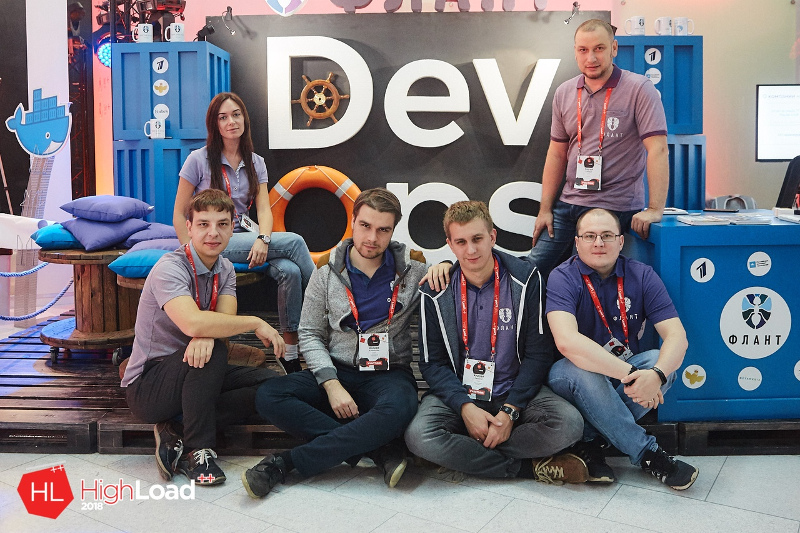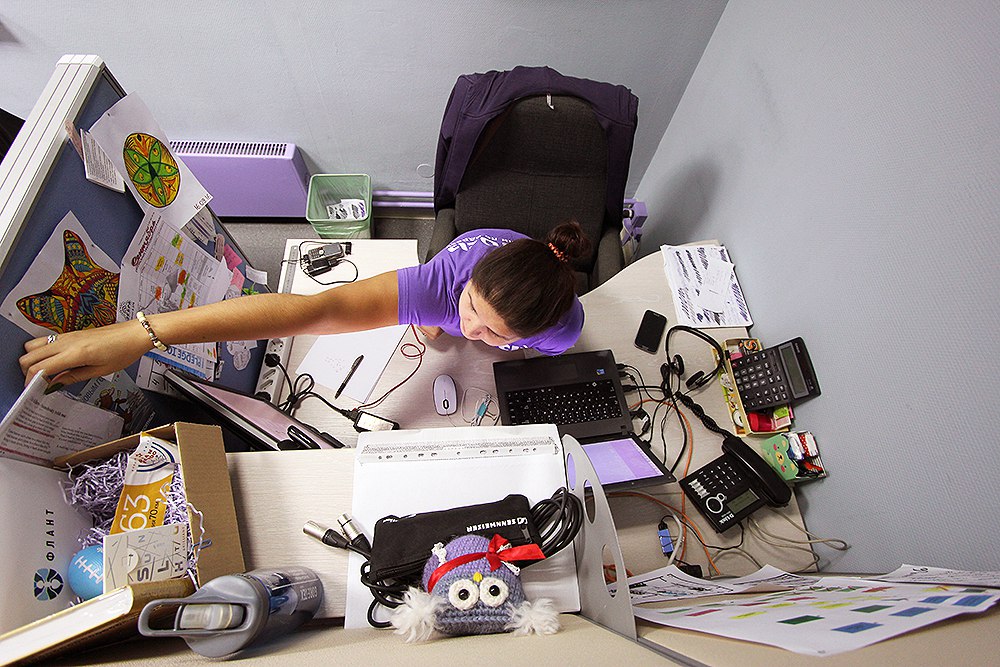“Atypical attitude to finance” - what if employees themselves will manage income. Conversation with Flant

In a world where only your business can make you truly rich, people still go to work for hire. Firstly, not everyone is happy to be businessmen, but they need to live. Secondly, everything is clear and safe at work - you fulfill your function, and most take on the risks of others. From here grow old haggling conflicts: owners want employees to be motivated, as if work is their own business; employees want to do what they are paid for, and no more.
These classic relationships have variations - options, interest, bonuses, which are a bit reminiscent of the owners and employees in the same boat. But there are less typical situations.
The Flant company consists of several Devopos teams that serve other people's production on a turn-key basis. They grew out of a gang of Linux student enthusiasts and fans, and now they have built a structure of “businesses within the business,” simply because it is more comfortable and more honest. Dima Stolyarov and Sasha Batalov told us how it works.
Flant was ranked among the best IT employers in 2018 with an average rating of 4.68. Judging by the estimates of the company at My Circle, employees believe that the company is making the world a better place, and they also appreciate Flant for interesting tasks, good team relationships, modern technology and communication with top management.
Linux student gang
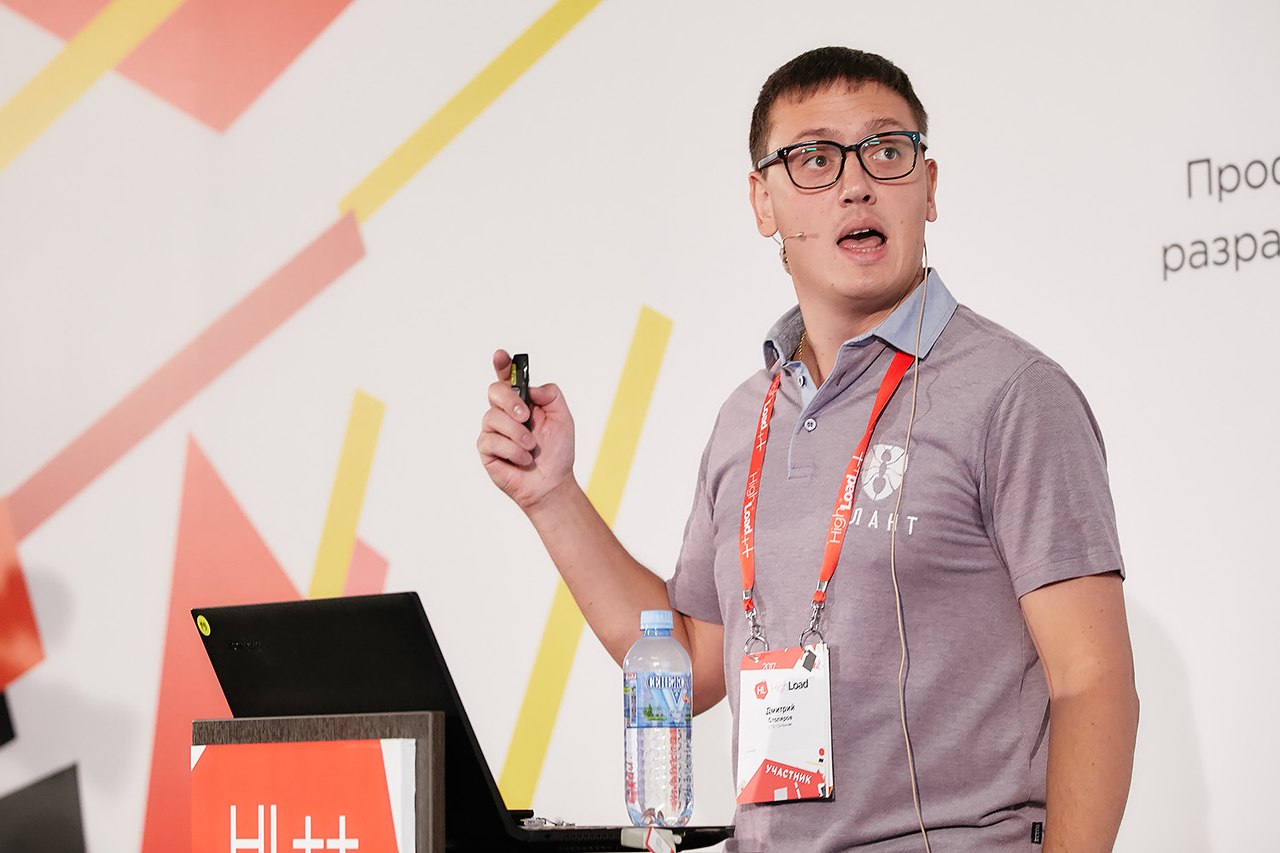
Dmitry Stolyarov (technical director) during his report
- (Dima Stolyarov) We always worked on Linux and open source, but started with a very funny topic, for which it’s a little embarrassing now. For some reason, we thought that we should implement Linux in offices instead of Windows. The company's first name was TrueOffice - “True Office”. Then we realized that nobody needed it. That was in 2006, I was 19 years old. Only in the year 2012-13 came the realization how to do business, what technologies the world needs.
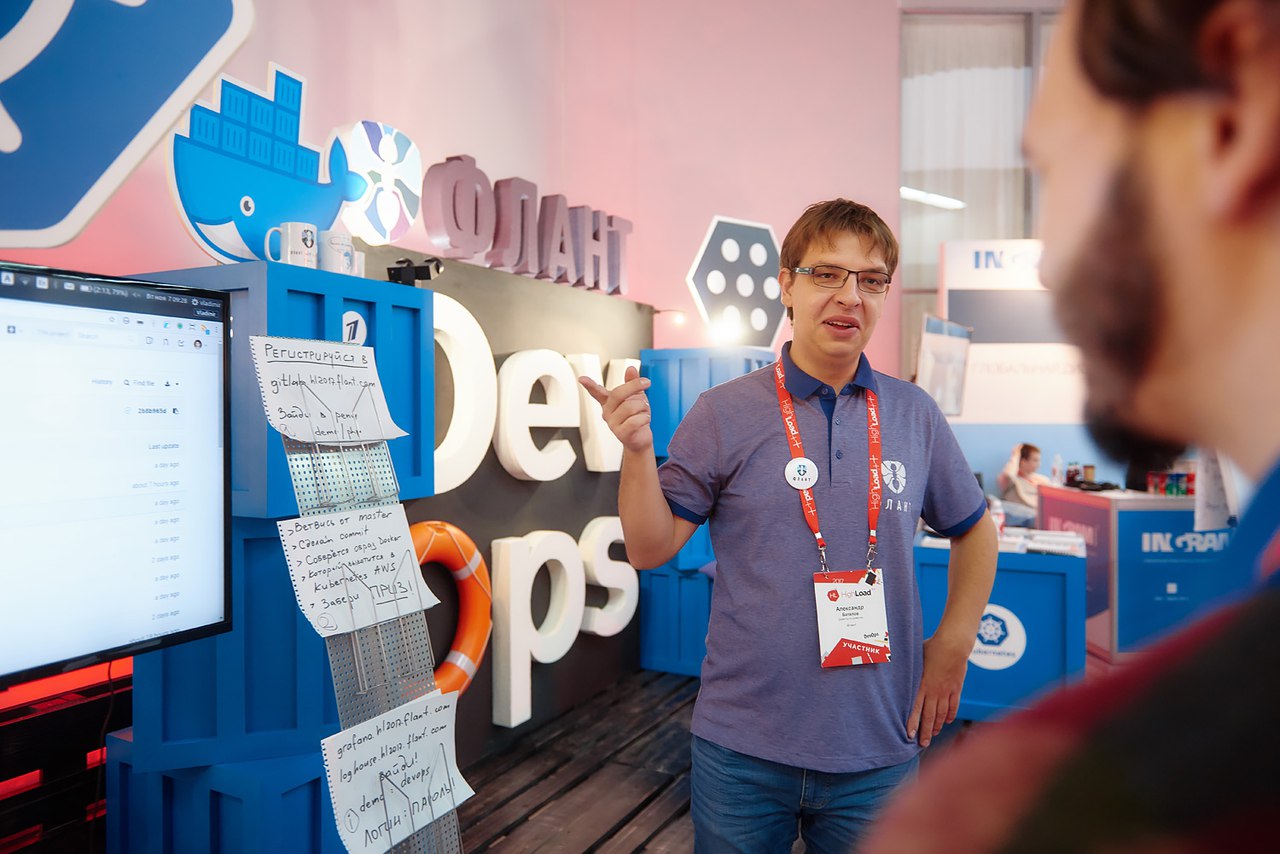
Alexander Batalov (CEO) at the company's booth at the conference
- (Sasha Batalov)In addition to technology, there is a huge layer in the form of marketing, sales and economics, which no one has ever taught us, except for courses at the university, but I do not know how generally they are applicable and useful.
At first it seemed to us that all this was not necessary, but then we had to comprehend in practice, read books, sometimes after the bumps were full. In general, we went a long thorny path, tried a bunch of all the wrong things.
- (DS) But gradually, as qualifications grew, they all specialized in Linux already, and now we only deal with highloads, highly loaded web projects. And when Kubernetes appeared, we quickly realized that this was the very foundation that was so lacking.
- Why was there such an interest in Linux? Ideological or technological?
- (DS)The company has two founders - Dima Shurupov and me. Dima Shurupov had more interest in open source. And I liked Linux, technologically, how everything is arranged there. And the result was a combination: Dima likes ideology, but I like technology. I love open source as an idea, but the technological side has always been more important to me.
Einstein said: "It is necessary to do as simple as possible, but not easier." Here Linux is built so simple, reliable and transparent that I enjoy it. We all liked it, and we were transformed from a gang of students into a big company. Now we are already 70. For IT, for specialized services - this is quite a lot.
- How was everything during the gang of students?
- (DS) Well, as usual, students have it - fun and provocatively.
- (Sat)A huge amount of altruism, the desire to conquer the Internet, to conquer technological peaks. We got involved in very difficult tasks - it happened, we took on serious (but very interesting!) Projects from the field of system integration, making them for a penny. They tried to make their own frameworks, absorbed all the technologies that they recognized, and immediately looked for them to use.
- Did everything work out commercially?
- (DS) Yes, but in the early stages we didn't need anything. In those days, 40 thousand rubles was an absolutely normal income for me, I shouted at them.
- (SB) And I thought that for a thousand dollars you can make any website you can imagine.
- (DS)In 2013, we did not have money to freely hire in Moscow. We have already taken all the acquaintances whom we could take. We decided to open an office in Nizhny Novgorod. We went there, opened, began to hire. Then they realized that living in two offices is difficult, and decided to live without any offices at all.
Of course, they filled a bunch of cones. Only in 2016, to my shame, did I read Remote. I cried and laughed because we traveled one on one. Each paragraph intersected with my personal experience.
- (SB) In every paragraph there were our scars.
What does flant do
We service turnkey highly loaded production. This differs from ordinary outsourcing, because we live with customers for a very long time and interact very closely, people trust us with one of their most important things. Their business largely depends on how we work.
To create a high-quality production operation, you need 15-20 devops, database specialists, Kubernetes, a support service and so on. And if the company is small, where there are only two or three dozen developers, this is impossible there. And here we come and save. Thousands for 150.
Previously, we had a mission to create a company in which we ourselves would be comfortable working, no matter how silly it sounds. Now that it’s succeeded, the mission is to make Google and Facebook-level technologies available to small businesses, startups in the early stages.
People can focus on their product, rather than overcoming problems that can not be overcome.
Many of the guys who come to us are surprised - how much is different, what are the loads everywhere. We have more than 50 projects in production, more than 70 clusters of Cuebrnetes. In this case, you can always twist. He opened the drawing, drew a microservice architecture, made a list of 200 technologies - and let's go. But this always leads to problems and consequences.
The trick is to ensure maximum stability, reliability and simplicity on the one hand, and a high level of innovation on the other. Well, we are proud that we can do this. We do this everywhere and in large quantities, as a conditional Ikea.
Who needs outsourced devs?

- It seems to me that large companies prefer to keep devops in the state.
- (SB) It’s clear that big players like Avito or Badoo can recruit devops. Small companies with huge investments can also - but they will pick up, and not the fact that they have the strength to cope.
We believe that even large companies should better contact the experts who ate this dog. Small companies with a web-based business just need to contact experienced people. Because any downtime in a key system is a loss of money.
- (DS)We know that people in Russia are afraid of outsourcing - due to negative experience, for other reasons. But customers do not leave us. For ten years, they left for only two reasons. Either they outgrew us (for example, they were bought and everything was rebuilt), or they closed because the idea did not work.
- And who comes to you more often - small companies or large ones?
- (DS) It’s the same now. But the little ones are simply afraid of us, they think that we are ...
- (SB) ... big, complex, inaccessible and are in the clouds.
- (DS) Well, yes, you walk past the cabin with Maybach and don’t go inside, do not ask the price, because Maybach cannot cost 500 thousand rubles.
- Of course it cannot.
- (Sat)But as soon as he appears in car sharing, you can afford to drive it.
- (DS) Yes, we, of course, are not Maybach - we are Ikea. We also succeeded simply, reliably and affordably. In general, the number of companies from the TOP-50 and small companies that contact us is the same. But we rely mainly on small businesses and work mainly with them, and try not to cooperate with large ones.
- Why?
- (DS) A lot of bureaucracy.
- (Sat)In a large company, there are many levels by which responsibility is distributed, feedback is very long, and often people start playing technology: “And let's weigh it, let's write a strategy, plan for the year ahead, let's do it better, it’s more beautiful for an enterprise culture , so our practice has developed. ” And so they begin to complicate things that can be solved in a simple short way so that 80% of the result will be tomorrow. They go a long way, where it is not known whether it will work at all or not.
As a result, instead of well-established practices, we reinvent the wheel, and the cost of a technological solution becomes incomparably higher. Moreover, the quality is not the fact that it will be better.
Outsourcing fee
We have a bunch of projects on Github, we are actively contributing the whole story to open source. Not only in ours - in strangers too. We try to share the tools that we use every day. We believe that this is our responsibility, and we are very pleased to do so.
All the guys in the company are contributing one way or another - either with reviews, or with documentation, or with a code. We believe that this is our payment for the whole rich world of open source utilities that we use. And I think we are worthy of this fee.
We call it the condensation of experience. Initially, one person learned something, rummaged with colleagues, the experience became folklore. Then we wrote down the documentation, and then pulled it into utilities and forgot about the existence, because we no longer think - everything is automatically taken into account.
The popularity of technology and the toxicity of developers
- Why exactly Ubuntu? Before being chosen, what else was considered?
- (DS) We were a gang of students who like Linux. And we used Gentoo for a long time - this is a source-based distribution, and every time we need to compile it from scratch. When we got a couple of hundred servers, the update took months. Of course, we first automated and optimized everything, but in the end we realized that we needed to change something, and, knowing the pros and cons of different solutions, we just took the most popular. Then it was intuitive - since the most popular, then it will be best to develop, and all the shortcomings will be corrected sooner or later.
There was such a Resync DB database. They competed with MongoDB and started at about the same time. And for a long time, Resync were technologically better.
When users arrived, they tried to solve internal system problems, and in MongoDB they solved them much less, but could conditionally instruct if to be better in synthetic tests. Therefore, the popularity of MongoDB grew. On the simplest cases, they showed themselves better, but inside were figs. And Resync DB inside was good, but it did not grow in popularity.
As a result, everything was fine with MongoDB inside, and nobody remembers Resync DB. The company went bankrupt. Ubuntu has something like this. There is a lot of focus on this distribution, so we decided to use it.
- How do you like the latest political changes, CoC and all that?
- (DS)Well ... there is no negative, everything is fine, everything is clear. I myself suffer from the fact that sometimes I offend people. For example, the thing seems obvious to me, and it begins to terribly enrage me that people do not understand it. I'm angry, and it turns out one negative (but I'm working on it).
Linus is very smart, after all, he has been working with this for 30 years. It’s clear that he’s a sharp dude, he doesn’t go into his pocket for a word. His politeness suffers, and the community is working on it. He himself understands and acknowledges everything.

“But, as I understood from the reaction in the discussions, many people support the idea of speaking bluntly and harshly, and if someone doesn’t like it, they don’t sugar, they will not melt.”
- (DS)No, it is not. I, as a person suffering from a lack of politeness, understand that this is very bad. It spoils the community. There are people who do not care, but for most people it is still important that there is emotional comfort.
There is a stupid error in the code. You can write: "Guys, it’s bad that we miss such simple things, we need to fix it." And you can write: "What an idiot did this ?!" One phrase. The person who made this mistake may be even smarter and more experienced than you, but he was simply out of sorts when he made a mistake - you never know what happened to him. And for him it will be a direct offense. Why is this needed?
You need to say things directly, but you do not need to say "What an idiot wrote this." It also makes no sense to hide and envelop, but there is no need to offend people.
Why do devops call each day
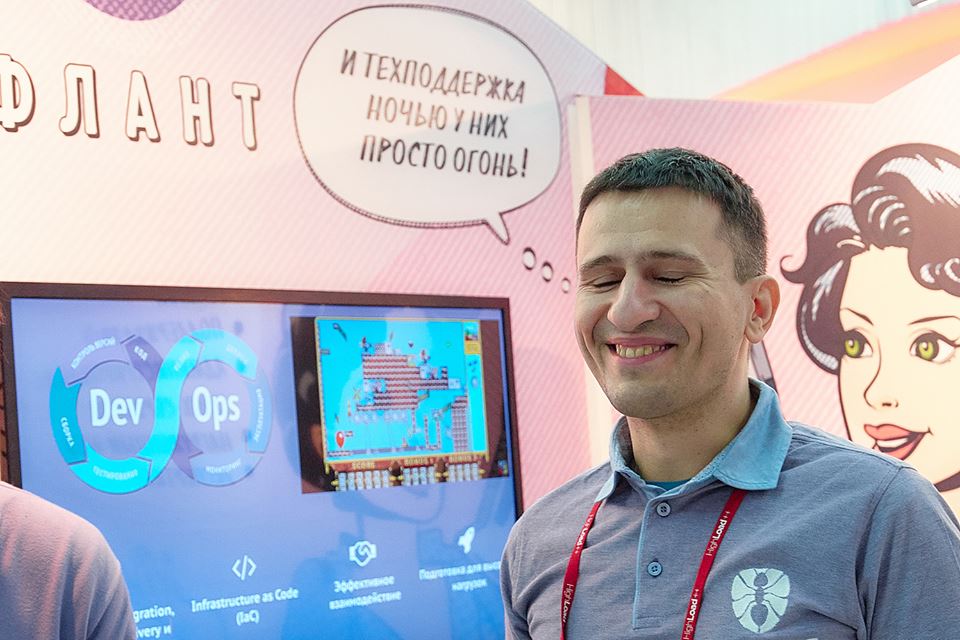
- (DS) Now we have one small office where documents lie and the office manager sits who deals with these documents.
The company has 70 people. 20 people is an OPS team. 30 people are three DevOps teams of about 10 people each. The remaining 20 are developers and sales. 8 developers, rnd department - 4 people. Non-technical people for the whole company 5-6 people.
Three DevOps teams earn key money. The processes are the same everywhere - a long rally every day, for an hour and a half. But there they sort out all the technical issues, and the guys decide what to do next. And since everything is remote, it is an opportunity to communicate normally.
- Is it really necessary every day?
- (DS) Yes.
“Does everyone agree with that?”
-(DS) Yes, everyone agrees, everyone is comfortable. But on some days, the rally can go up to 30 minutes. Despite the very intensive communication in Slaka, I still want to synchronize well, to understand what happened yesterday. We want to understand each other, and not just click tasks. This is a culturally important point.
- (SB) Something can happen at every moment, the situation can change. Constant adjustment is needed.
- (DS) You have a good joke on this subject.
- (SB) Yes. The cardiac surgeon arrives at the auto center, and the mechanic tells him: “Listen, we are doing the same thing, only you operate on the human heart, and I am the heart of the car. You get $ 10,000 for the operation, and I pay 100 rubles for the service.
The surgeon asks: “Do you also want to get 10 thousand for repairs?” Such a mechanic - of course. The surgeon gets into the car, starts and says - "sort through."
Also with us. In development, you can take the task and bring the result in two weeks. Then everything can be corrected, because plus or minus three days does not affect anything.
And in our case, every missed alert or incorrect decision on alert can turn into a very big problem. To prevent this, close, fast, constant communication is needed.
Is it hard to switch to udalenka
It’s hard to manage people remotely. But this is difficult as long as you are in one office, and they are in another, and there is a blurred consciousness. You are sitting in Moscow and it seems to you that the guys from Nizhny are working poorly, inefficiently. In Moscow, you see the efforts of people around, but the efforts of remote workers - no. You accept only the result.
The office has a lot of communication in an informal way - someone said something to someone on the way to the kitchen. People in another office do not see this, do not feel it, and the context is lost.
By the time we were ready to leave the office, all communications (even with employees in the same room) went through Google Meet. And when we built all the communication remotely, it worked 100%, all the barriers of misunderstanding were removed.
It’s difficult to build everything, but if everything is done correctly, it works and does not cause any discomfort.
How teams manage their money themselves
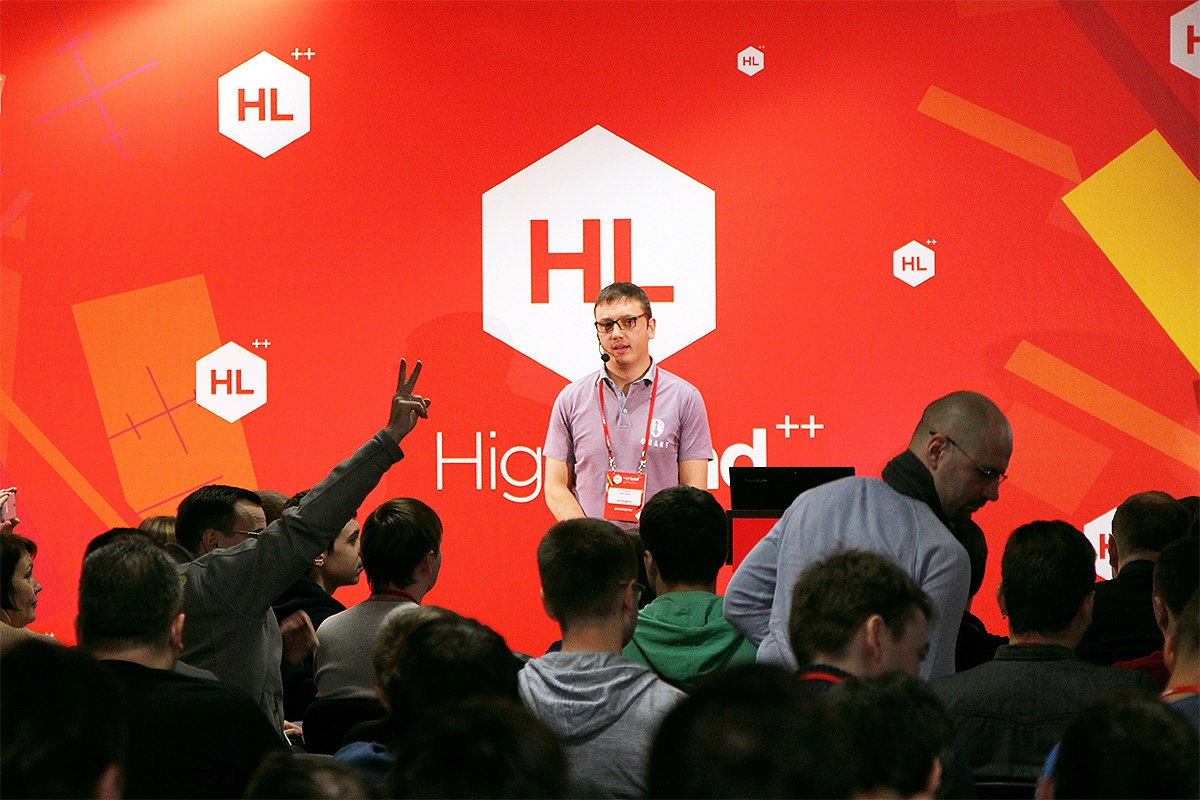
- Udalenka is a controversial issue. Sometimes companies are afraid to let people go home because they think they are supposed to lose control over them. But those who are released also say that work needs to be completely different.
- (DS) We have solved this problem by the fact that we are ready to share money with teams. Our entire economy and motivation system is built almost like a franchise. Salaries are high enough, plus we leave the guys free money.
The team serves the project pool. They know how much each of these projects makes. They definitely know their share of this money. All the money that remains beyond their salaries remains in the team and is divided between them according to a certain system. The motivation is absolutely direct - they took the project for another 200 thousand, added ten more to the salary. Made a mistake - you need to compensate the client.
- (SB) If you start to let the guys down, then this is immediately felt. You are depriving yourself of the opportunity to receive additional income. And our system solves the control problem completely. A person makes a plan for every day, and there are enough daily rallies to understand who is doing what.
- (DS) In the conditions of hostilities, comrade in the trenches do not lie.
- So, do you have open salaries? Does everyone know how much they get?
- (DS) We closed salaries some time ago. There is a regional difference. Despite the fact that we strive to pay the full Moscow salary in the regions, there is still some dissonance.
- (SB) Now everyone knows how much money the team has. They see how much of the bonuses they receive.
- (DS) Timlid, each team decides how much his guys will receive, and how to distribute bonuses. We get into this issue exclusively with advice, the decision is always up to the team leader.
Why do people fear jobs?
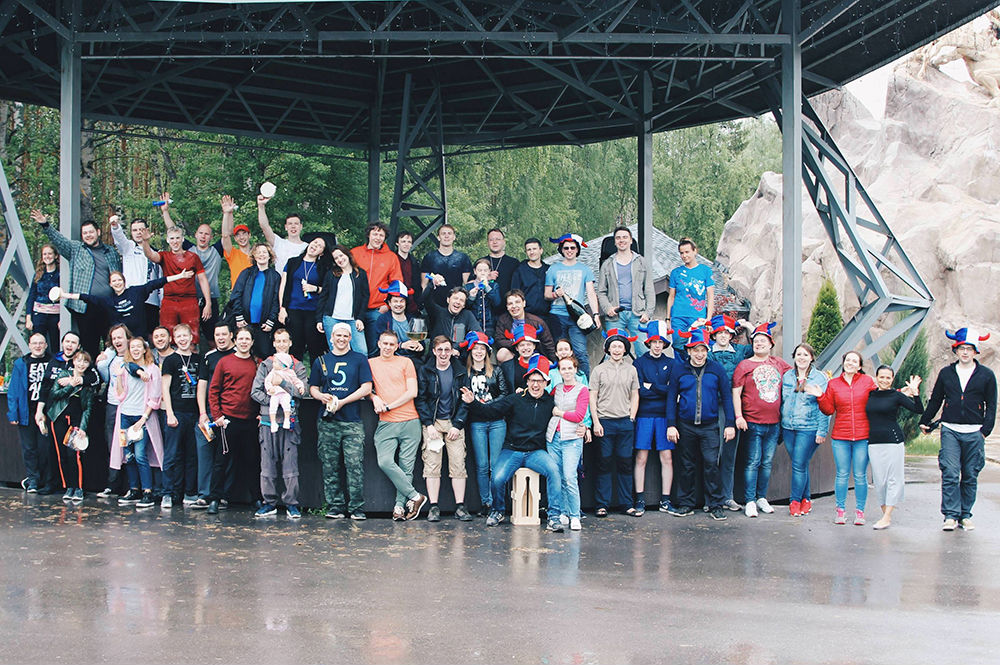
Celebrating the 10th anniversary of the company in 2018
- do you have 70 people?
- (DS) No. We have a plan to take at least 20 DevOps engineers in a year. But it is very difficult. We have a large enough pool of candidates, everyone knows about us one way or another. But here is the story as with customers. A lot of people say, "we are afraid to work for you, all of a sudden we will not pull it." But we do not think that we have super cosmic things here.

Correspondence with the candidate
- What do you need to be in order to pull?
- (DS) Theoretically, a person should be evenly developed in development and operation. In practice, there are only a few such people in the world, not to mention Russia. Especially those who are senior here and there. I would not even relate myself to them.
In our vacancies it is always well written what you need to know. We work on them a lot and try to write essentially.
- Maybe vacancies really scare away, if it is scheduled, how much do you need to know?
- (DS) No, no, no, we don’t think we need to know a lot.
- (SB) We are not interested in knowledge, but in thinking, the person’s ability to seek solutions.
- (DS) The experience in Linux is of interest, and we test it with fairly simple tasks - just a lot. Our test is quite long, with an average candidate, it takes 8 hours. And according to the results, we look at how a person coped with problems, how he google, what his horizons are.
We can gain knowledge very quickly, because there are many different projects and experienced colleagues who will always tell you. Therefore, we look first of all so that the guys quickly think and have experience.
“Besides the test, do you somehow reveal this?”
- (DS) We have three phases. Eichar first communicates, asks to tell about the experience. Then, those who liked Heycharu pass the test task. According to the results, the Timlids communicate, and speak to the eychar their opinions, and if they are unanimously good, this is an occasion to make an offer to a person.
500 thousand rubles to hire the future superman
- (DS) We have a very atypical attitude to finance, we share with teams and are not greedy. And we allot the team 500 thousand rubles to expand the state. That is, this is a grant so that they can find a person, teach everything while he is pouring in.
- 500 thousand per person ?!
For the team to earn a lot of money, they need to take more projects. To do this, they need more people. And to take more people, you need more money. It's a vicious circle. To break this circle, we give money for a new person. While he is pouring in, they can collect more projects and pay his salary out of that money. That is, it is compensation until the newcomer brings money.
“Isn't that too much for devops?” They are loaded every day, every day in combat conditions, and they also have to deal with financial management.
- (DS) This is the Timlid, and he’s not quite a devoops anymore. Timlids are more likely to partner to have options. Therefore, we think that is normal for them. But ordinary guys in the team are not affected.
Roughly speaking, they know - if a colleague falls off, the next month they get his salary. Of course, they will have to work harder. And when they find a replacement, give him that money back.
And when we give the Timlids 500 thousand, they do not want to take a man who does not shoot. And sometimes it’s easier for them to weed out 20 people and take one. It so happened that 100 people talked with the eychar, 30 of them went on a technical task, 20 passed, and all but one, the timlid weeded out. This is tin. Timlids are very much afraid to take risks. We discussed the topic, and everyone seemed to understand that this was a mistake. Many people show themselves at an interview not in the way they will work later. Therefore, we must give a chance and take risks.
“But the team’s timids are not starting to abuse?” You get 500 thousand, you don’t hire for a very long time, you get another 500 thousand.
- (DS)They get paid once. We say - “You now have ten people, but you need 11. There is a sales plan, more projects will come and you need to be ready. Here is 500 thousand for the eleventh position. " You won’t get them the second time. And if someone leaves, this is the team’s problem, they solve the problem within their budget.
It is like a game of monopoly.
- (SB) We believe the team leader should be immersed in finance. At our place, people get their salary from the money that they earn. And the degree of project costs is very important. A client comes with one infrastructure, and in a year his infrastructure is 10 times larger. And if the team leader is not involved in the finances, he will not be able to adequately assess the cost of maintenance.
- (DS)It happens that the team fights for several months with the client’s problems, realizes that they are paid a conditional one hundred thousand for this, and this does not correspond to what is happening now. And no matter how painful, they must either raise the price, or part. And the guys make these decisions themselves. Despite the fact that they are all on a remote site. And we believe this is our greatest achievement. We have truly autonomous motivated teams.
- Yes. And from this it sounds like you have to be superman to work for you. And technical skills, and self-discipline, and financial literacy.
- (SB) We can become a superman. But even those team leaders who know how to do this came as ordinary engineers. A year or two is enough for a person to turn into such a superman.
- Timlide partners grew out of ordinary engineers. Or can they be immediately hired for such a position?
- (DS) We haven’t had this before, they all grew out of engineers. But we are considering a case to unite with a small company, which will become just another one of our team. We would like to try this.
- Can you take a person if he is a good engineer, but not organized enough for the level of such teams?
- (DS) We are not afraid of unorganized people, we have the same stream of tasks. It is quickly revealed whether it is possible to help a person organize. If every day he will tell what he has done, without doing anything in reality, he will be ashamed.
When you see that everyone is sitting in the same boat and rowing, you are uncomfortable throwing a paddle. In such circumstances, even unorganized people become organized. Well, if not, then no.
We terribly do not tolerate superficiality - in people, in deeds and in ourselves. And getting here, people are developing very fast, three times faster than anywhere else. We really have a year in three in terms of experience and skills.
We really do not like surface middle. From our point of view, the middle is a person who can already do a lot. I’ll say as it is - the DevOps market is terribly smeared. There are middles who consider themselves junas. There are joons who consider themselves lords. A person coming to us very quickly understands his real level.
This does not mean that we do not take the jones - we take with pleasure, and we will take even more. We are already creating a special team called “DevOps Accelerator” and allocate projects where we can take risks, where the client is ready, so that we take risks. Probably, even a special service for this will appear. Some kind of "Flint Light."
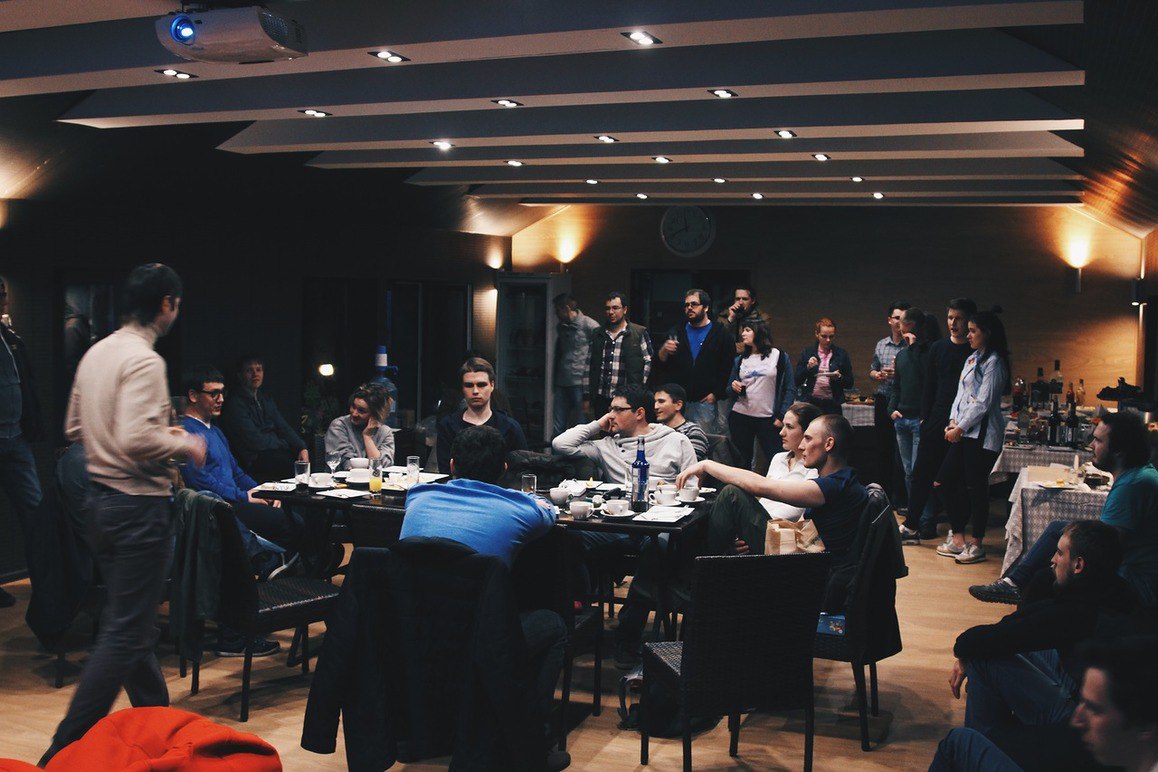
- Would you like to become a large corporation?
- (DS) We would like, but with one caveat. I really do not want to lose my culture. We will definitely grow, but maintaining a technical and working culture is even more important than development itself.
We have one life, you still won’t earn all the money, but you want to live it next to good people. We categorically unacceptable bureaucracy, the simulation of useful work. We have absolutely horizontal connections. It is possible and in the harshest form to convey your thought to the leadership: the essence is more important than formalities.
- (SB) But you need to have very good arguments for this.
- (DS)Of course! And remote work is also needed, because we live this way, we see the world. Dima Shurupov lives in Thailand, I am in Germany. Sasha Batalov in Moscow, HR Director in Tyumen.
We believe that living on this planet, I want to live life by watching it. Living in conditions when it’s unpleasant for you to go to work is not necessary. Therefore, we want our work to be wanted. Conflict at work is definitely unpleasant, so we make sure that there are no conflicts at work. We have disputes and battles, but not conflicts.
- Do not you think that to become big - this means not only to provide services, but also to produce. What is necessary not only to live life and see the planet, but also to leave something?
- (DS)This is a very sore subject for us, because we are a service company. But we do a lot of software, and in fact our product is services with a completely different efficiency. We never sold watches or people to anyone. Customers always came and asked - "can you buy a hundred hours"? No, you can’t, we do not sell watches.
We sell the result. The result is that we relieved the pain, solved the problem. And we decide not as we were told, but as we ourselves know. Our product is our experience. And we will definitely make ready-made solutions, SaaS-products, there are many ideas. But there is no hurry. There are many decades ahead.

